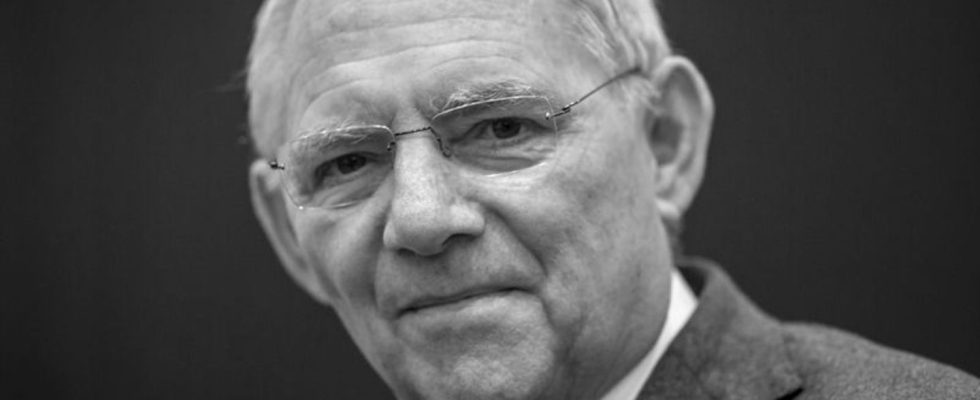CDU politician
A life for politics: Wolfgang Schäuble died
Former Bundestag President Wolfgang Schäuble is dead. Photo
© Michael Kappeler/dpa
Wolfgang Schäuble, one of the most influential politicians of the past decades, has died. The Baden native has achieved a lot in his political life. But he was also denied important positions.
Former Bundestag President Wolfgang Schäuble is dead The CDU politician fell asleep peacefully at home with his family on Tuesday evening around 8 p.m., the family told the German Press Agency.
Schäuble died after a long, serious illness. In his political career he was a minister, CDU leader, parliamentary group leader and President of the German Bundestag. Nobody has been a member of Parliament longer than him.
Schäuble was born on September 18, 1942 in Freiburg. He studied law, but was drawn to politics early on. He joined the CDU in 1965. In 1972 he won a mandate for the Bundestag for the first time, where he served without interruption until his death.
Reactions from the CDU
The CDU chairman Friedrich Merz reacts with dismay to Schäuble’s death. The news fills him with great sadness, writes Merz on the platform X (formerly Twitter). “With Wolfgang Schäuble, I am losing my closest friend and advisor that I have ever had in politics. My thoughts are with his family, especially his wife Ingeborg.”
CDU federal treasurer Julia Klöckner said his death gave pause and made people sad. “Wolfgang Schäuble was an exceptional person, an impressive thinker and speaker, a loyal and critical colleague. He shaped our country as a minister, as President of the Bundestag, as a politician who conscientiously fulfilled his duty and service.”
Green Party leader pays tribute to Schäuble
The Green Party leadership also praised Schäuble as a defining political figure in Germany. “He was a giant of parliamentarism and a defining figure for our country for decades. His place in the history books is certain,” wrote party leader Omid Nouripour on Platform X.
The Green party leaders Katharina Dröge and Britta Haßelmann said they had great respect for Schäuble’s impressive commitment as a member of the German Bundestag. “His work has shaped this country. We thank him for his impressive commitment to our parliamentarism and our democracy.”
Career under Kohl
Decades of German politics are associated with the name Schäuble. Under Chancellor Helmut Kohl (CDU), he was initially head of the Federal Chancellery and Federal Minister for Special Tasks, and from 1989 to 1991 Federal Minister of the Interior. Schäuble helped negotiate the unification treaty in the GDR after the fall of the Berlin Wall. Since the assassination attempt on him by a mentally disturbed man in October 1990, Schäuble has been in a wheelchair, but his political career has continued. From 1991 to 2000 he led the CDU/CSU parliamentary group. After the Union lost power in 1998, Schäuble became party leader as part of the CDU’s realignment. Angela Merkel became Secretary General.
In the turmoil of the CDU donations affair and after statements about a 100,000 mark cash donation, Schäuble resigned as CDU leader in February 2000. Merkel became party leader, and in 2005, as chancellor, she made Schäuble interior minister, and four years later, finance minister. Schäuble held the office for two electoral terms; he created the “black zero”, i.e. a federal budget without new debts.
Second highest office in the state: President of the Bundestag
After the 2017 federal election, Schäuble was elected President of the Bundestag, the second highest office in the state, as the successor to Norbert Lammert. Schäuble was denied the highest office in the state, that of Federal President.
After the 2021 federal election, which the Union lost, Schäuble withdrew from the leadership committees. In the Bundestag, the SPD politician Bärbel Bas became president, and Schäuble was now a member of parliament. In his speech as Senior President – the MP with the most years of service – he promoted open discourse and self-confident MPs.
In his party, Schäuble was one of the conservative politicians; behind the scenes, his words always carried weight. On the other hand, he had earlier than others called on the CDU to be open to alliances with the Greens. As early as 2007, he told the “Frankfurter Allgemeine Sonntagszeitung”: “Black-green is not our wish, but it is an option for the Union.” In the struggle for the 2021 candidacy for chancellor, Schäuble sided with the then CDU leader Armin Laschet and opposed CSU leader Markus Söder.
Politics also often played a role in Schäuble’s private life. Father Karl Schäuble was already a CDU politician and a member of the Baden state parliament. Schäuble’s younger brother Thomas was also a politician; he was state minister in Baden-Württemberg for 13 years. He died in 2013 as a result of a heart attack. The top CDU politician Thomas Strobl was Wolfgang Schäuble’s son-in-law, daughter Christine, the ARD program director, and Strobl’s wife. Schäuble leaves behind a total of four children and his wife Ingeborg, to whom he was married since 1969.

